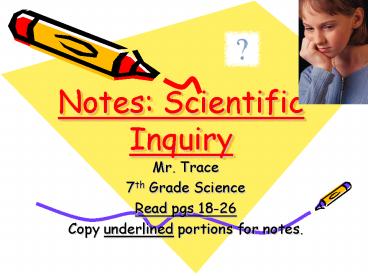Notes: Scientific Inquiry - PowerPoint PPT Presentation
1 / 24
Title:
Notes: Scientific Inquiry
Description:
Scientific Inquiry Scientific Inquiry: the ways in which scientists investigate the natural world and propose explanations based on evidence they gather. – PowerPoint PPT presentation
Number of Views:289
Avg rating:3.0/5.0
Title: Notes: Scientific Inquiry
1
Notes Scientific Inquiry
- Mr. Trace
- 7th Grade Science
- Read pgs 18-26
- Copy underlined portions for notes.
2
How Scientists Think
- Scientists use the same steps that most people
use everyday to solve problems without even
knowing it. - You probably think like a scientist all of the
time.
Video
3
Scientific Inquiry
- Scientific Inquiry the ways in which scientists
investigate the natural world and propose
explanations based on evidence they gather. - Scientific Inquiry and the scientific method are
the same thing.
Video
4
1. Ask a Question
- Ask a Question Ask a question based on
observations. - How can I do well in science?
Video
5
Ask a Question Cont.
- Observations using one or more of your senses to
gather information. - You have noticed you are not doing as well in
science as you would like.
6
Two types of Observations
- Quantitative Observations dealing with an number
or amount. - Qualitative Observations that deal with
descriptions.
7
Ask a Question Cont.
- Inferring when you explain or interpret the
things you observe. - I have not been paying too much attention to what
Mr. Trace has been teaching lately.
8
Ask a Question Cont.
- Predicting make a forecast on what will happen
in the future based on your observations. - If I pay attention more and follow directions
more carefully, I may do better.
9
2. Form a Hypothesis
- Form Hypothesis. A testable explanation for a set
of observations or answer to a scientific
question. - I can listen to the teacher and follow
instructions carefully.
Video
10
Hypothesis
- A hypothesis can also be written as an IfThen
statement such as, If I study hard, then I will
get an A.
11
Hypothesis
- A hypothesis must be testable.
- Researchers must be able to carry out
investigations and gather evidence that will
either support or disprove the hypothesis.
12
3. Test the Hypothesis
- Test Hypothesis. Form and conduct an experiment
to test your hypothesis. - I will follow directions for one assignment and
not follow directions for another.
Video
13
Experiments
- Variables the factors that can change in an
experiment. You should only have one variable
that changes. - In our experiment, it should only be listening
and following directions in different amounts.
Video
14
Control
- A control is a part of the experiment to which
you can compare the results of the other tests. - Can be the rest of the class continuing to do the
same thing.
Video
15
4. Analyze Results
- Analyze Results. Collect and put data into a
readable form. Charts, graphs, and tables work
well. - What happened when you followed directions? When
you didnt follow directions?
Video
16
5. Conclusion
- Conclusion A summary of what you have learned
from your experiment. When I followed directions
I got an A, when I didnt follow directions I got
an F. I was right, if I listen and follow
directions, I will do well in science.
Video
17
6. Communicate Results
- Communicate Results. Share your results in
written or presentation form. - Show and tell your family that you got an A in
science.
18
Out of Order?
- The steps of the scientific method can be changed
or rearranged depending on needs. - If your data does not prove your hypothesis you
can create a new hypothesis and retest.
19
Experiment Form
- All lab write ups need to have the following
sections. - Title
- Problem
- Hypothesis
- Materials
- Procedures
- Data/Analysis
- Conclusion
- Graph
20
Experiment Form
- Title Explains the experiment.
- Doing Well in Science.
- Problem What do you want to learn?
- How can I do well in science?
21
Experiment Form
- Hypothesis What do you think the answer to your
question may be? - If I listen and follow directions, I will do
well. - Materials A numbered list of everything you will
use. - 1. Teacher.
- 2. Grade results.
22
Experiment Form
- Procedures A numbered set of instructions for
performing your experiment. - 1. Go to class.
- 2. Listen and follow directions.
- 3. Analyze grade results.
23
Experiment Form
- Data/Analysis Record your data into a chart or
graph. - Listened A
- Didnt listen D
- Conclusion What did the results of your
experiment prove? - To do well in science, you should listen
carefully and follow directions.
Video
24
The Real Test
- Lets launch ourselves into a fun test.
- This one will keep you hanging.































